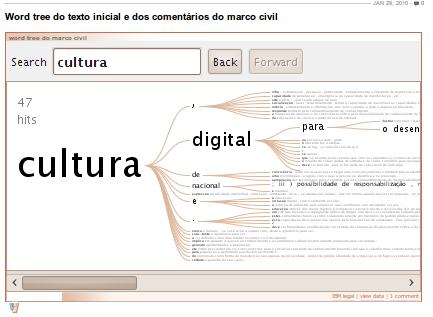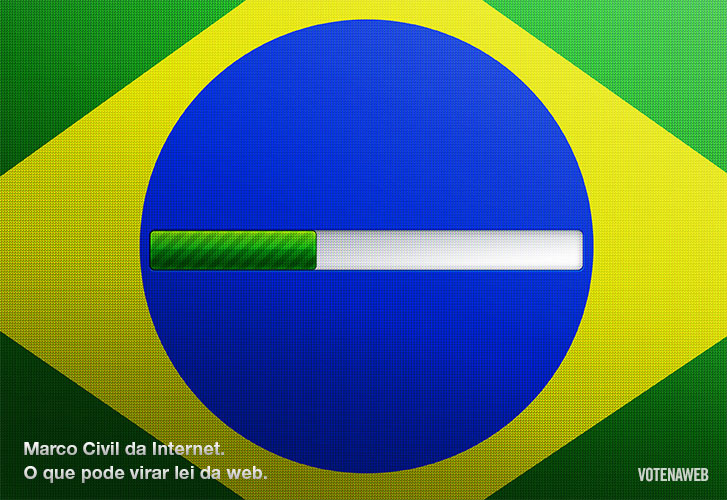The Marco Civil, a ‘bill of rights for Internet’ users in Brazil, will come to a vote on August 8, 2012. While the majority seems to support the approval of the law, some are against the broad freedom that the initiative will bring.
Since October 29, 2009, the Bureau of Legislative Affairs of the Brazilian Ministry of Justice (SAL/MI), in partnership with Rio de Janeiro's Law School (DIREITO RIO) from Getulio Vargas Foundation, has been working on the collaborative creation of Marco Civil da Internet (Civil Regulatory Framework for the Internet) [pt].
The document has been created through public consultation. The population was encouraged to participate giving opinions and commentary through an online platform [pt]. As a result, several changes have been made to the original text, eventually passing through the Civil House and making it to the Chamber in 2012. Unlike Internet-related laws addressing piracy or copyright infringement, the Marco Civil is not a criminal law, but a civil one.
In an article written by Ellery Biddle for Global Voices Advocacy, she contextualizes the implications behind the bill, as well as the process followed for its creation. This same process places Brazil in a pioneering position in digital policy and may well serve as a model for many other countries.
With such wide participation from the population, it was also expected that some would criticize and some would support the initiative. Many entities are in favour of the final version of the Bill of Rights. In a recent statement, Brazil's Internet Society (ISOC Brasil) [pt], a chapter fully recognized by the Internet Society (ISOC) [pt] declared its support to the approval of the proposal. The Comitê Gestor da Internet (CGI, Internet Manager Committee) [pt] also declared support [pt], stating:
Resolve tornar público seu amplo apoio ao parecer final do relator da Comissão Especial na Câmara dos Deputados, Deputado Federal Alessandro Molon, congratulando-o pelas alterações esclarecedoras e aprimoramentos precisos que promoveu no texto do projeto de lei (…)
Several campaigns in support were created, and after the 2nd Internet Forum, which took place in the city of Olinda, in Recife, early July, participants decided to create a petition [pt] in support of the bill of rights. The intention was to get the most number of signatures as possible.
Netizens also commented on Twitter under the hashtag #marcocivil.
The Pirate Party (@partidopirataBR), a profile that defends access to information, sharing of knowledge and privacy rights, started a campaign urging MP's support in the approval of the project.
@luiza_erundina Deputada, contamos com sua presença e apoio à aprovação do relatório do #MarcoCivil na próxima semana!
Some politicians also showed support. In a video published by the Frente Parlamentar da Cultura, Federal MP from Paraná João Arruda describes Marco Civil as “the best law in the world concerned with the Internet”.
Yes vs. No
Despite such support, the bill still divides opinions. While the majority seems to support passing of the bill, some position themselves against it, because of the broad freedom that Marco Civil brings to the Internet.
According to the law, service providers (such as Youtube and Facebook) would not have any responsibility over the content being uploaded by their users, and wouldn't be able to remove content – even if offensive – without a warrant, because such attitude is seen as a violation of freedom of expression. Professor Marcelo Thompson, from the University of Hong Kong, explains:
If the online service provider knows with certainty it is hosting content crudely offensive to someone’s privacy, sexual orientation, children’s rights, you name it, and does nothing about it — actually, even if the provider explicitly acknowledges the offensive nature of the content, even if it acts out of sheer cruelty in leaving things as they stand –, its conduct will not carry any liability whatsoever.

Word tree of the original text and comments on the bill of rights, created by Transparência Hackday / Esfera for Observatório do Marco Civil.
In an interview [pt] for the iPNews website, the president of the Comissão de Direito Eletrônico e Crimes de Alta Tecnologia (Committee of Electronic Rights and High-Technology Crimes) from OAB/SP, Coriliano Almeida Camargo, stated why he is against Marco Civil:
o projeto viola direitos de segurança, resposta e vedação de anonimato e defende a isenção de responsabilidade por parte de provedores, contrária a decisão do Superior Tribunal de Justiça (STJ), e para a Fecomercio-SP (Federação do Comércio de Bens, Serviços, Turismo do Estado de São Paulo), a medida pode fazer da internet uma “terra sem lei”, pois se o Marco Civil for aprovado pode representar perigo para segurança de usuários da web.
On Twitter, Mario Marino (@gigantopitecus) also said why he opposes [pt] the bill:
O #MarcoCivil ao isentar o provedor da responsabilidade objetiva trata de derrogar a obrigação do Estado prover instrumento de identificação.
The Blog MegaNão, an initiative against internet surveillance, reports [pt] on several entities pressuring against the approval of Marco Civil:
As empresas de Telecomunicações e a indústria do Copyright estão fazendo forte lobby na Câmara dos Deputados para segurar o Marco Civil da Internet, esta pressão ainda conta com o apoio do Ministério das Comunicações. Os oponentes do Marco Civil já anunciaram abertamente que farão de tudo para atrasar a votação e que não concordam que a neutralidade da rede faça parte do Marco Civil.
The vote is scheduled for August 8. The last voting day was expected to take place on June 11, but ended up being cancelled due to lack of quorum. Whatever the result, once again, Brazil has the chance to create new paths in the digital arena.








14 comments
“vedação de anonimato” actually means the constitutional prohibition on posting anonymous opinions
I’ve commented on the original in Portuguese, so let me say here as well:
I am not against Marco Civil at all. Rather, I am very much in favour of it.
What I am against is its dynamics of civil liability, where a regime of impunity is established for — even intentional — human rights violations by online service providers.
Such a dynamics violates the Brazilian Constitution and Brazil’s international human rights obligations, and it is in complete disagreement with the treatment of the subject by international law, as I discuss here: http://bitly.com/RljjP9
I trust lucidity asks us to recognize that a regime of liberty founded upon the violation of human rights is not, after all, a regime of liberty. But colleagues in Brazil seem to think otherwise. They say the liability provision of Marco Civil is “very lucid”: http://bit.ly/MPPWBM
Alright, then. What can I say?
Best wishes,
Marcelo Thompson
P.S.: The quote of my article included above by Fernando and Sara is important indeed, but do read the whole piece if you have the time:http://bitly.com/O6YLdp